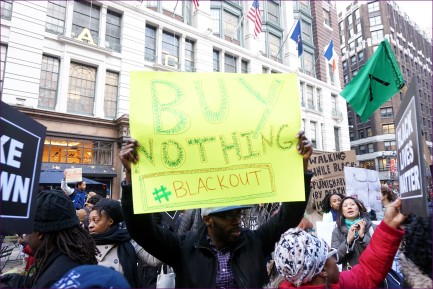As many commentators have pointed out, in refusing to stand for the American national anthem and “show pride in a flag for a country that oppresses black people and people of color,” NLF back-up quarterback Colin Kaepernick has joined a tradition of black athletes who have used their fame to promote civil rights. But his actions have also provided his fans and supporters with an opportunity to engage in another storied American political tradition—consumer activism.
Consumer activism has deep roots in American history, stretching back to the boycotts of “baubles from Britain” in the lead-up to the American Revolution. Black civil rights activists have long spent (or refused to spend) their dollars in the service of their cause. Consumer activism was central, for example, to many of the key battles of the Civil Rights Era, from the Montgomery Bus Boycott to the lunch-counter sit-ins. More recently, the Black Lives Matter movement disrupted shopping on Black Friday—the busiest shopping day of the year in the US—to draw attention to police killings of African Americans.

NYC action in solidarity with Ferguson, MO, encouraging a boycott of Black Friday consumerism in November 2015. (Photo by The All-Nite Images licensed under CC BY 2.0)
The news that Kaepernick’s jersey is now the top seller in the NFL suggests a spontaneous, grassroots move by consumers to use their “purchasing power for justice” (to paraphrase the slogan of the League of Women’s Shoppers, an influential consumer organization of the 1930s and 1940s). The “buycott” of Kaepernick’s jersey has the support of some celebrities like Susan Sarandon (who recently tweeted that she was waiting for hers to arrive) but the spontaneous nature of the protest is striking.
Buycotts normally involve deliberately buying for political reasons the products produced or sold by a particular store, company, or country. Here the support being expressed is for the individual represented by the jersey, rather than the seller, which is the NFL itself, though players get a cut. Not wanting to benefit financially from his principled political stand, Kaepernick says he won’t keep the money earned from jersey sales, but will donate it to “back into the communities! I believe in the people, and WE can be the change!”
It would be interesting to know if the buycott began in response to the reports that some San Francisco 49ers’ fans were burning his Jersey to express their disapproval of his refusal to stand for the US national anthem. (One former fan of the controversial quarterback suggested that, in addition to never being allowed to play in the NFL again, Kaepernick should “move to Canada.” Is the implication that Canada is such a bastion of anti-Americanism that an un-American anthem-hating American would fit right in? Given the US national anthem’s history, historian Gerald Horne suggests that refusing to honour it should be the norm rather than the exception.) Setting aside the question of whether buying over-priced corporate merchandise is the best way to contribute to a political cause, this form of consumer activism undoubtedly sends a strong signal of support for Kaepernick’s brand of civil rights activism.

